Witnesses to Presence: Reading Jewish Women’s Holocaust Memoirs as Holy Texts
The dominant theme of post-Holocaust Jewish theology has been that of the temporary hiddenness of God, most commonly interpreted as God’s deferral to human freedom. Yet a feminist reading of the traditional Jewish image of the Shekhinah as a female figure of divine presence accompanying Israel into exile counters such theologies of absence, as do the narratives of resistant presence to the suffering of the other found in women’s memoirs of the Holocaust period. Indeed, the masculinist bias of post-Holocaust theology only becomes fully apparent when considered in the light of both feminist conceptions of God and women’s holocaustal experiences and relational priorities.
This paper attends to the process by which a feminist theology of the Holocaust can be derived from the correlation of testimony and an essentially masculinist Jewish theological tradition. In the act of correlation memory becomes witness and is taken into the sphere of the holy: the sphere in which revelation becomes possible. Yet, ironically, this religious methodology might not so much give women victims a voice as silence them once more. When the Auschwitz survivor Judy Weissenberg Cohen wrote to me saying, ‘I am convinced that God was absent in Auschwitz-Birkenau - at least, according to what I saw around me, there was nothing but pure, unadulterated Evil doing its work in the guise of so called humans’, I questioned, not for the first time, whether I – as an Anglo-Jewish woman born fifteen years after the liberation of Auschwitz - had any right to appropriate Jewish women’s suffering to my own feminist theological project.
Moreover, the genre of memoir resists its sacralization. The women’s memoir literature is neither art nor historiography. Still less is it theology. While Jewish history is, for Jews, a sacred history, taken up into the sweep of revelation and redemption, Jewish women’s experience will not be consoled or generalized. Even in the one camp of Auschwitz, these women’s experience was shaped by factors of class, political affiliation, age, geographical origin, status within the camp hierarchy and so forth.
Granting their particularity, this paper argues that the reading of largely secular Jewish women’s memoirs of the Holocaust as holy texts is not to coerce them into religious truth claims or to say that others know better how to interpret their experience. To call these texts holy, that is to make a claim for their canonicity, is not to speak on behalf of their authors or to re-write what they wrote, but to say that the reading of texts is a very Jewish sort of religious experience and can constitute a ‘discernment situation’ where the meanings of women’s stories continues to unfold in other women’s lives;that as text the narrated memory of Israel can be read antiphonally and midrashically into new stories of covenantal love.
At once broken and powerful, narratives of presence accrue holiness in so far as they can be read as pericopae – fragments of a larger text now lost and which a redactor works to piece back together. For in their testimony to the indestructibility of love in a place set apart for its destruction these texts participate in the transfigurative properties of the holy. And because revelation is an aesthetic category and moment, theological reading can be a judgement of the religious imagination so that the narration of women holding, covering, warming, feeding and encircling other women in Auschwitz becomes a figure or tableau of God’s maternal presence to suffering.
Dr Melissa Raphael is Principal Lecturer in Theology and Religious Studies at the University of Gloucestershire, England. She is the author of Thealogy and Embodiment: The Post-Patriarchal Reconstruction of Female Sacrality (Sheffield: Sheffield Academic Press, 1996);Rudolf Otto and the Concept of Holiness. (Oxford: Clarendon Press, 1997);Introducing Thealogy: Discourse on the Goddess (Sheffield: Sheffield Academic Press, 1999/ Cleveland, Ohio: Pilgrim Press, 2000);The Female Face of God in Auschwitz: A Jewish Feminist Theology of the Holocaust (London &New York: 2003). A study proposing a Jewish Aesthetic Theology is in preparation.

